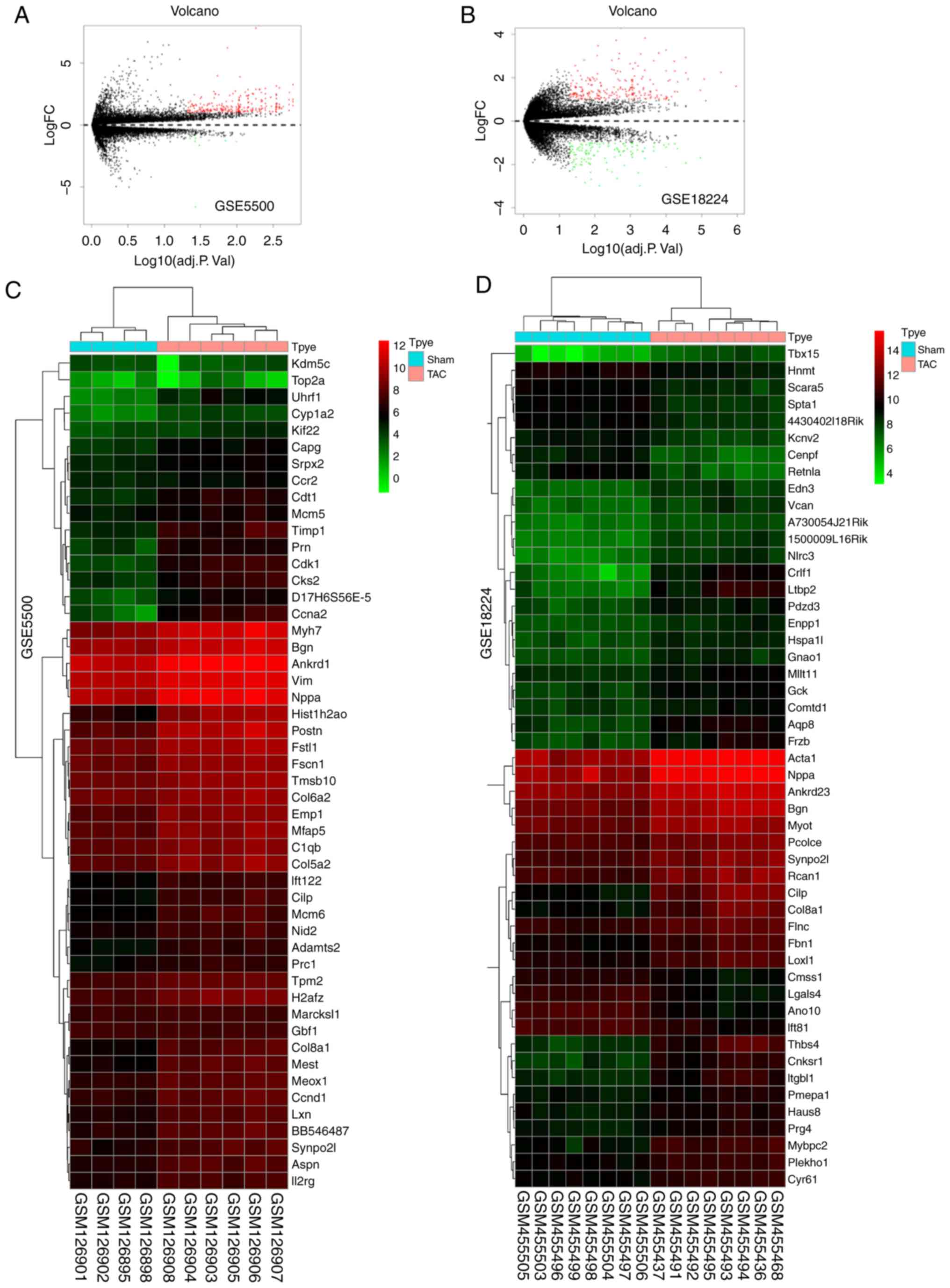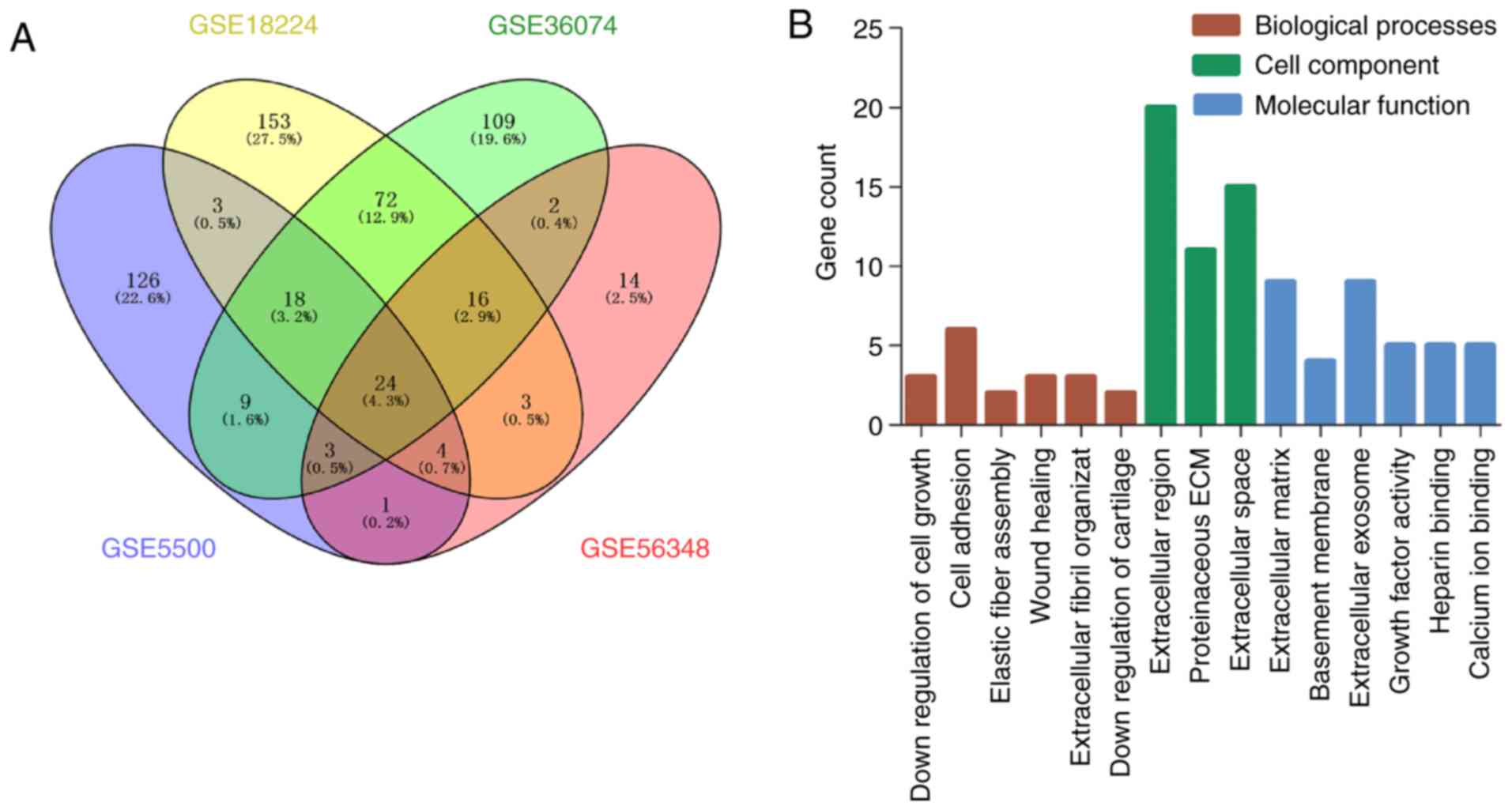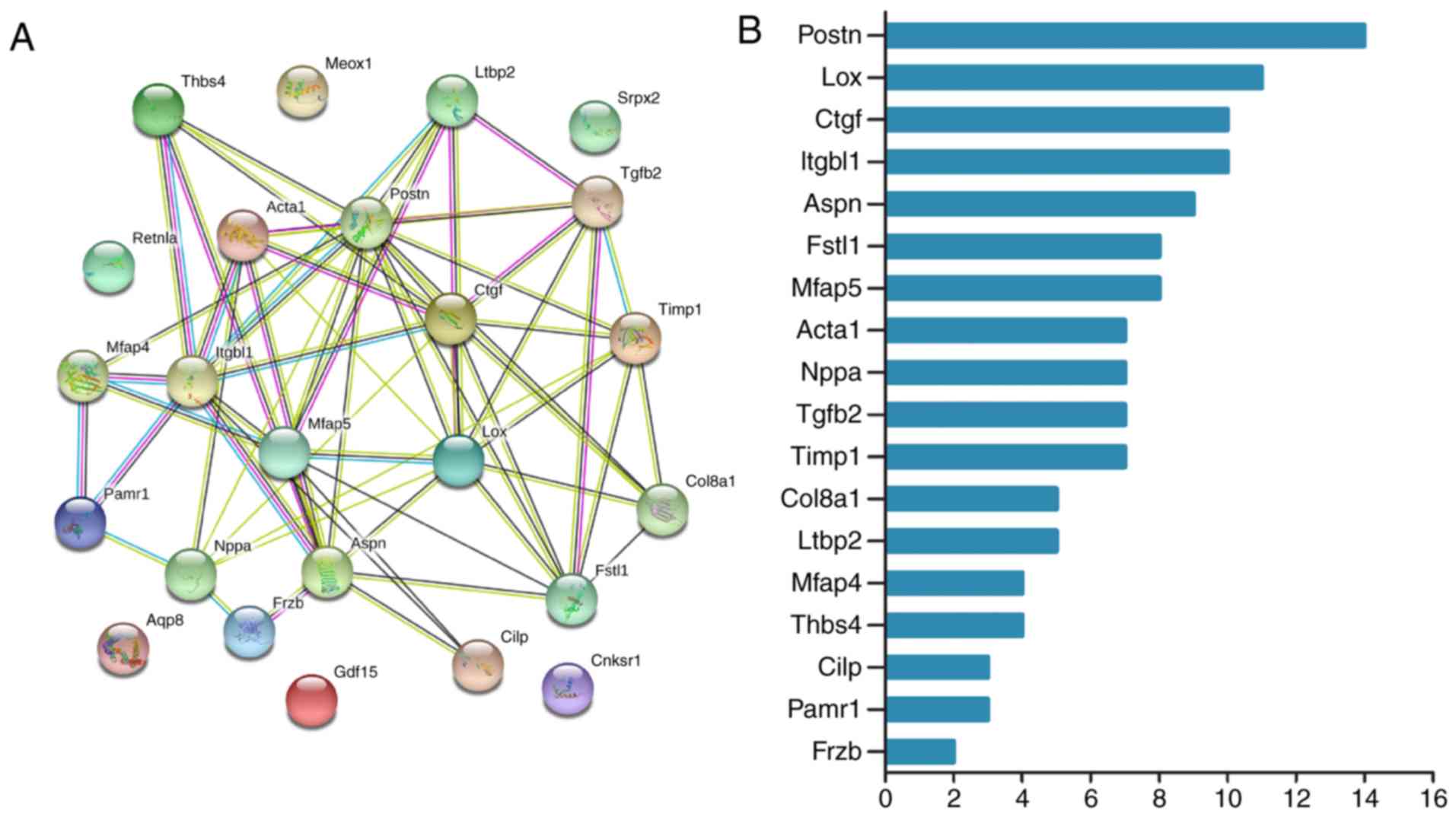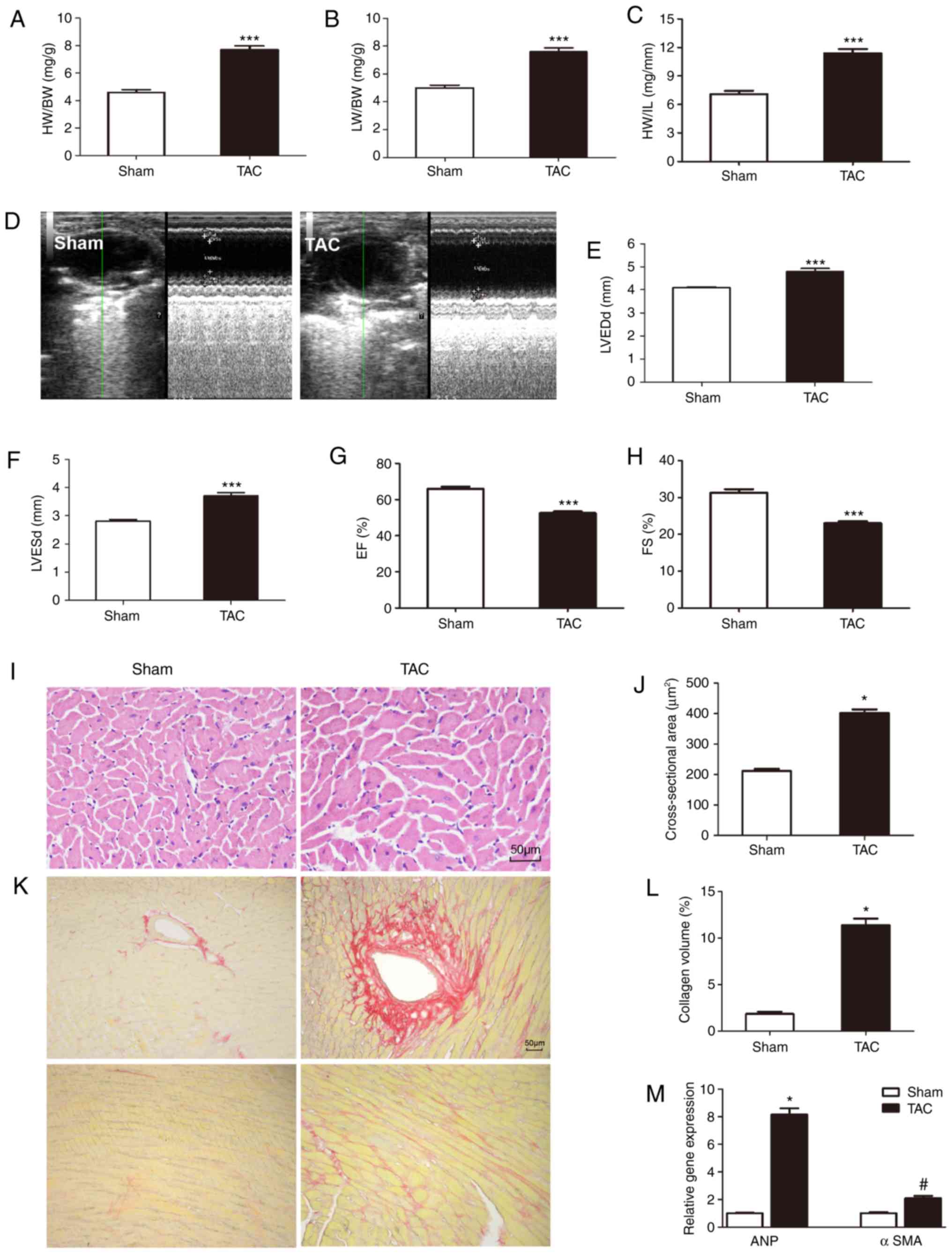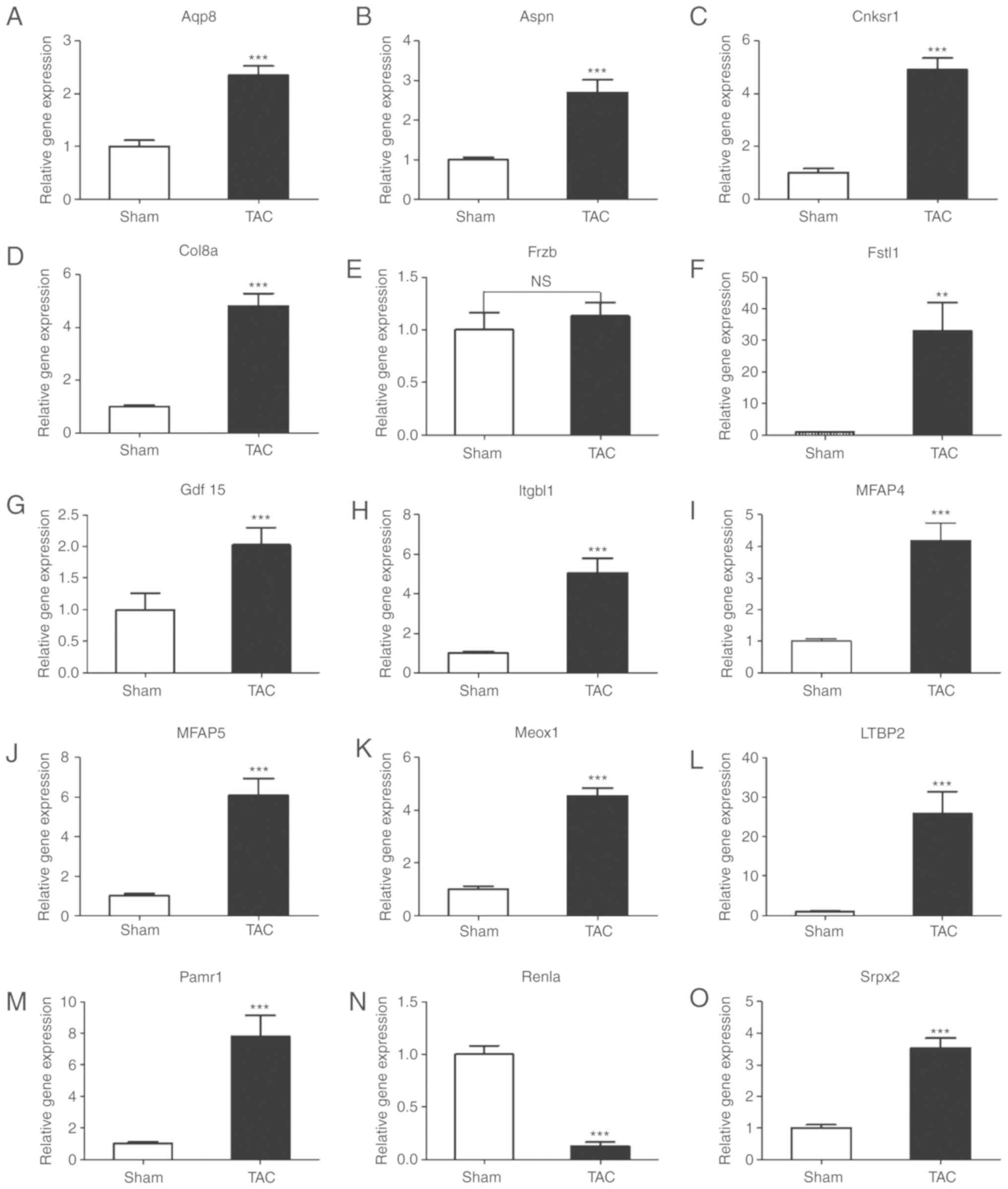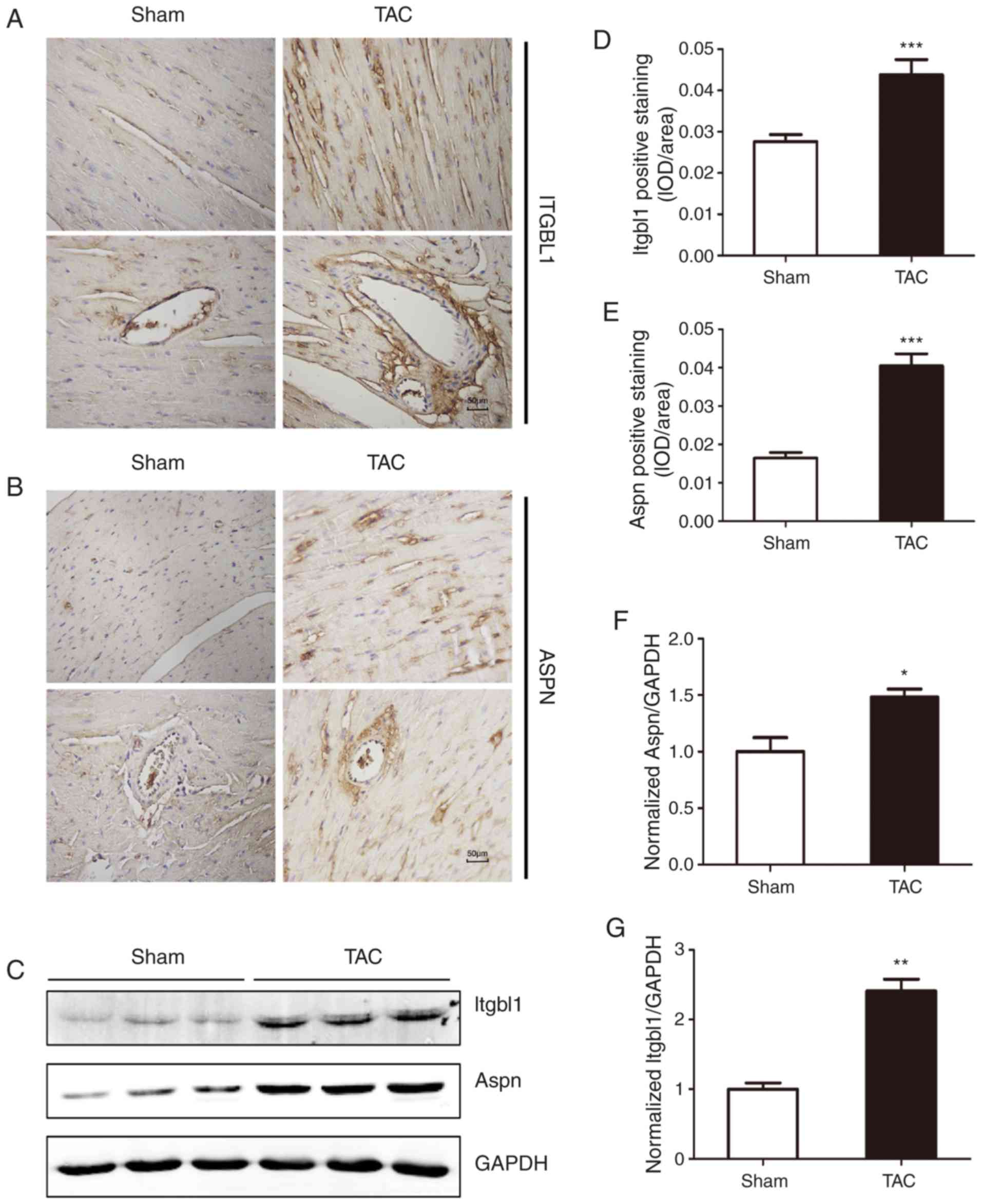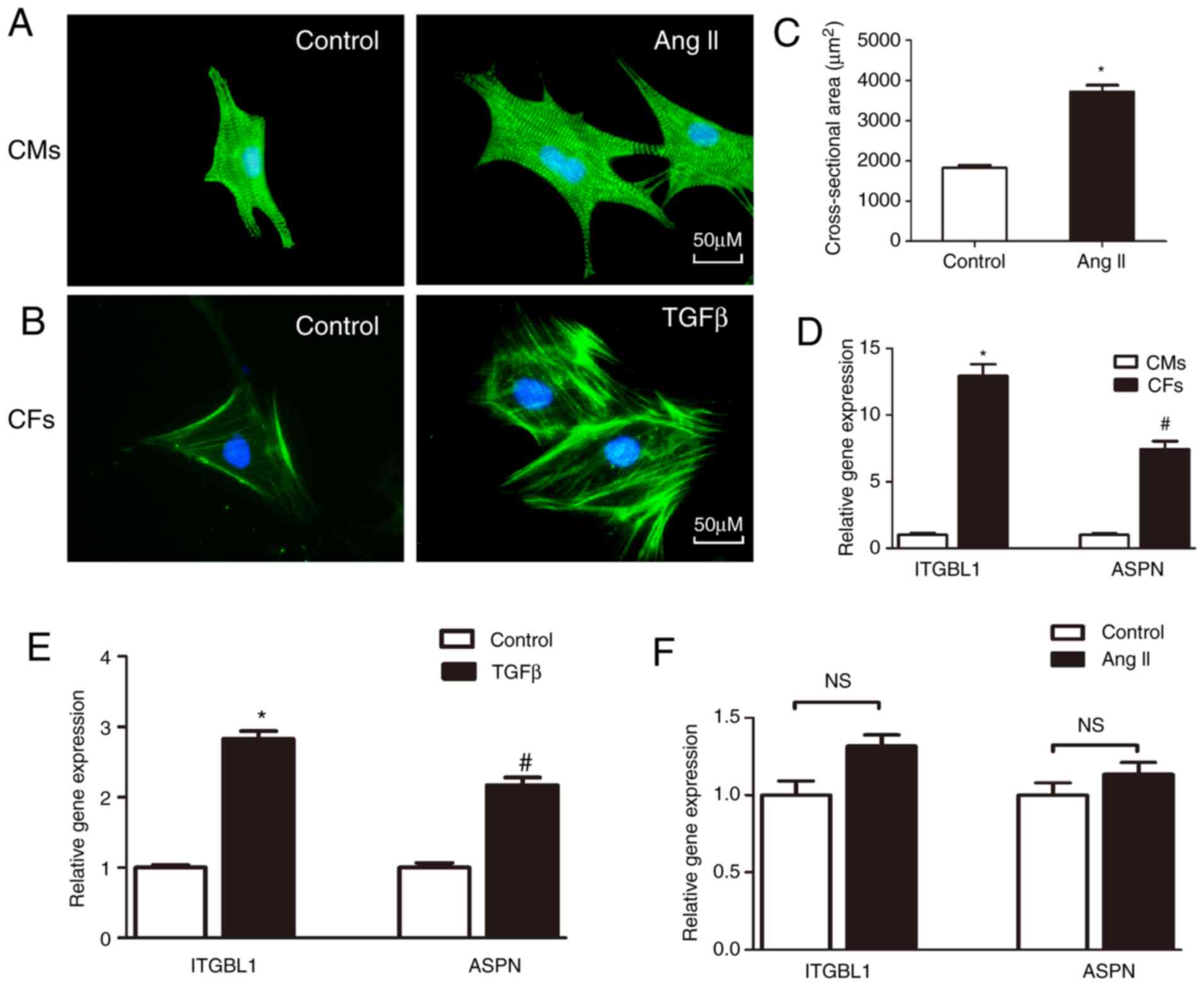|
1
|
Yusuf S, Wood D, Ralston J and Reddy KS:
The World Heart Federation's vision for worldwide cardiovascular
disease prevention. Lancet. 386:399–402. 2015. View Article : Google Scholar : PubMed/NCBI
|
|
2
|
Sandri M, Viehmann M, Adams V, Rabald K,
Mangner N, Höllriegel R, Lurz P, Erbs S, Linke A, Kirsch K, et al:
Chronic heart failure and aging-effects of exercise training on
endothelial function and mechanisms of endothelial regeneration:
Results from the leipzig exercise intervention in chronic heart
failure and aging (LEICA) study. Eur J Prev Cardiol. 23:349–358.
2016. View Article : Google Scholar
|
|
3
|
Schirone L, Forte M, Palmerio S, Yee D,
Nocella C, Angelini F, Pagano F, Schiavon S, Bordin A, Carrizzo A,
et al: A review of the molecular mechanisms underlying the
development and progression of cardiac remodeling. Oxid Med Cell
Longev. 2017:39201952017. View Article : Google Scholar : PubMed/NCBI
|
|
4
|
Wu QQ, Xiao Y, Yuan Y, Ma ZG, Liao HH, Liu
C, Zhu JX, Yang Z, Deng W and Tang QZ: Mechanisms contributing to
cardiac remodelling. Clin Sci (Lond). 131:2319–2345. 2017.
View Article : Google Scholar
|
|
5
|
Keeler AM and Flotte TR: Cell and gene
therapy for genetic diseases: Inherited disorders affecting the
lung and those mimicking sudden infant death syndrome. Hum Gene
Ther. 23:548–556. 2012. View Article : Google Scholar : PubMed/NCBI
|
|
6
|
Barbosa C, Peixeiro I and Romao L: Gene
expression regulation by upstream open reading frames and human
disease. PLoS Genet. 9:e10035292013. View Article : Google Scholar : PubMed/NCBI
|
|
7
|
Patel A and Cheung SW: Application of DNA
Microarray to clinical diagnostics. Methods Mol Biol. 1368:111–132.
2016. View Article : Google Scholar
|
|
8
|
Hanif W, Alex L, Su Y, Shinde AV, Russo I,
Li N and Frangogiannis NG: Left atrial remodeling, hypertrophy, and
fibrosis in mouse models of heart failure. Cardiovasc Pathol.
30:27–37. 2017. View Article : Google Scholar : PubMed/NCBI
|
|
9
|
Guo Y, Bao Y, Ma M and Yang W:
Identification of key candidate genes and pathways in colorectal
cancer by integrated bioinformatical analysis. Int J Mol Sci.
18:E7222017. View Article : Google Scholar : PubMed/NCBI
|
|
10
|
Bisping E, Ikeda S, Kong SW, Tarnavski O,
Bodyak N, McMullen JR, Rajagopal S, Son JK, Ma Q, Springer Z, et
al: Gata4 is required for maintenance of postnatal cardiac function
and protection from pressure overload-induced heart failure. Proc
Natl Acad Sci USA. 103:14471–14476. 2006. View Article : Google Scholar : PubMed/NCBI
|
|
11
|
Fliegner D, Schubert C, Penkalla A, Witt
H, Kararigas G, Dworatzek E, Staub E, Martus P, Ruiz Noppinger P,
Kintscher U, et al: Female sex and estrogen receptor-beta attenuate
cardiac remodeling and apoptosis in pressure overload. Am J Physiol
Regul Integr Comp Physiol. 298:R1597–R1606. 2010. View Article : Google Scholar : PubMed/NCBI
|
|
12
|
Skrbic B, Bjørnstad JL, Marstein HS,
Carlson CR, Sjaastad I, Nygård S, Bjørnstad S, Christensen G and
Tønnessen T: Differential regulation of extracellular matrix
constituents in myocardial remodeling with and without heart
failure following pressure overload. Matrix Biol. 32:133–142. 2013.
View Article : Google Scholar
|
|
13
|
Lai L, Leone TC, Keller MP, Martin OJ,
Broman AT, Nigro J, Kapoor K, Koves TR, Stevens R, Ilkayeva OR, et
al: Energy metabolic reprogramming in the hypertrophied and early
stage failing heart: A multisystems approach. Circ Heart Fail.
7:1022–1031. 2014. View Article : Google Scholar : PubMed/NCBI
|
|
14
|
Huang da W, Sherman BT and Lempicki RA:
Systematic and integrative analysis of large gene lists using DAVID
bioinformatics resources. Nat Protoc. 4:44–57. 2009. View Article : Google Scholar : PubMed/NCBI
|
|
15
|
Popik OV, Saik OV, Petrovskiy ED, Sommer
B, Hofestädt R, Lavrik IN and Ivanisenko VA: Analysis of signaling
networks distributed over intracellular compartments based on
protein-protein interactions. BMC Genomics. 15(Suppl 12): S72014.
View Article : Google Scholar
|
|
16
|
Yuan YP, Ma ZG, Zhang X, Xu SC, Zeng XF,
Yang Z, Deng W and Tang QZ: CTRP3 protected against
doxorubicin-induced cardiac dysfunction, inflammation and cell
death via activation of Sirt1. J Mol Cell Cardiol. 114:38–47. 2018.
View Article : Google Scholar
|
|
17
|
Ma ZG, Dai J, Zhang WB, Yuan Y, Liao HH,
Zhang N, Bian ZY and Tang QZ: Protection against cardiac
hypertrophy by genipo-side involves the GLP-1 receptor/AMPKα
signalling pathway. Br J Pharmacol. 173:1502–1516. 2016. View Article : Google Scholar : PubMed/NCBI
|
|
18
|
Zhang X, Ma ZG, Yuan YP, Xu SC, Wei WY,
Song P, Kong CY, Deng W and Tang QZ: Rosmarinic acid attenuates
cardiac fibrosis following long-term pressure overload via
AMPKα/Smad3 signaling. Cell Death Dis. 9:1022018. View Article : Google Scholar
|
|
19
|
Wang HB and Yang J, Ding JW, Chen LH, Li
S, Liu XW, Yang CJ, Fan ZX and Yang J: RNAi-mediated downregulation
of CD47 protects against ischemia/reperfusion-induced myocardial
damage via activation of eNOS in a rat model. Cell Physiol Biochem.
40:1163–1174. 2016. View Article : Google Scholar
|
|
20
|
Schorb W, Booz GW, Dostal DE, Conrad KM,
Chang KC and Baker KM: Angiotensin II is mitogenic in neonatal rat
cardiac fibroblasts. Circ Res. 72:1245–1254. 1993. View Article : Google Scholar : PubMed/NCBI
|
|
21
|
Toth A, Jeffers JR, Nickson P, Min JY,
Morgan JP, Zambetti GP and Erhardt P: Targeted deletion of Puma
attenuates cardiomyocyte death and improves cardiac function during
ischemia-reperfusion. Am J Physiol Heart Circ Physiol. 291:H52–H60.
2006. View Article : Google Scholar : PubMed/NCBI
|
|
22
|
Azhar M, Brown K, Gard C, Chen H, Rajan S,
Elliott DA, Stevens MV, Camenisch TD, Conway SJ and Doetschman T:
Transforming growth factor Beta2 is required for valve remod-eling
during heart development. Dev Dyn. 240:2127–2141. 2011. View Article : Google Scholar : PubMed/NCBI
|
|
23
|
Takawale A, Zhang P, Patel VB, Wang X,
Oudit G and Kassiri Z: Tissue inhibitor of matrix
metalloproteinase-1 promotes myocardial fibrosis by mediating
CD63-integrin β1 interaction. Hypertension. 69:1092–1103. 2017.
View Article : Google Scholar : PubMed/NCBI
|
|
24
|
Schwartz K, de la Bastie D, Bouveret P,
Oliviéro P, Alonso S and Buckingham M: Alpha-skeletal muscle actin
mRNA's accumulate in hypertrophied adult rat hearts. Circ Res.
59:551–555. 1986. View Article : Google Scholar : PubMed/NCBI
|
|
25
|
Deschepper CF, Masciotra S, Zahabi A,
Boutin-Ganache I, Picard S and Reudelhuber TL: Functional
alterations of the Nppa promoter are linked to cardiac ventricular
hypertrophy in WKY/WKHA rat crosses. Circ Res. 88:223–228. 2001.
View Article : Google Scholar : PubMed/NCBI
|
|
26
|
Liu X, Gai Y, Liu F, Gao W, Zhang Y, Xu M
and Li Z: Trimetazidine inhibits pressure overload-induced cardiac
fibrosis through NADPH oxidase-ROS-CTGF pathway. Cardiovasc Res.
88:150–158. 2010. View Article : Google Scholar : PubMed/NCBI
|
|
27
|
Hu C, Dandapat A, Chen J, Fujita Y, Inoue
N, Kawase Y, Jishage K, Suzuki H, Sawamura T and Mehta JL: LOX-1
deletion alters signals of myocardial remodeling immediately after
ischemia-reperfusion. Cardiovasc Res. 76:292–302. 2007. View Article : Google Scholar : PubMed/NCBI
|
|
28
|
Kaur H, Takefuji M, Ngai CY, Carvalho J,
Bayer J, Wietelmann A, Poetsch A, Hoelper S, Conway SJ, Möllmann H,
et al: Targeted ablation of periostin-expressing activated
fibroblasts prevents adverse cardiac remodeling in mice. Circ Res.
118:1906–1917. 2016. View Article : Google Scholar : PubMed/NCBI
|
|
29
|
Zhang CL, Zhao Q, Liang H, Qiao X, Wang
JY, Wu D, Wu LL and Li L: Cartilage intermediate layer protein-1
alleviates pressure overload-induced cardiac fibrosis via
interfering TGF-β1 signaling. J Mol Cell Cardiol. 116:135–144.
2018. View Article : Google Scholar : PubMed/NCBI
|
|
30
|
Sun L, Wang D, Li X, Zhang L, Zhang H and
Zhang Y: Extracellular matrix protein ITGBL1 promotes ovarian
cancer cell migration and adhesion through Wnt/PCP signaling and
FAK/SRC pathway. Biomed Pharmacother. 81:145–151. 2016. View Article : Google Scholar : PubMed/NCBI
|
|
31
|
Li XQ, Du X, Li DM, Kong PZ, Sun Y, Liu
PF, Wang QS and Feng YM: ITGBL1 is a Runx2 transcriptional target
and promotes breast cancer bone metastasis by activating the TGFβ
signaling pathway. Cancer Res. 75:3302–3313. 2015. View Article : Google Scholar : PubMed/NCBI
|
|
32
|
Wang M, Gong Q, Zhang J, Chen L, Zhang Z,
Lu L, Yu D, Han Y, Zhang D, Chen P, et al: Characterization of gene
expression profiles in HBV-related liver fibrosis patients and
identification of ITGBL1 as a key regulator of fibrogenesis. Sci
Rep. 7:434462017. View Article : Google Scholar : PubMed/NCBI
|
|
33
|
Kaliakatsos M, Tzetis M, Kanavakis E,
Fytili P, Chouliaras G, Karachalios T, Malizos K and Tsezou A:
Asporin and knee osteoarthritis in patients of Greek origin.
Osteoarthritis Cartilage. 14:609–611. 2006. View Article : Google Scholar
|
|
34
|
Liu Y, Liu T, Wu J, Li T, Jiao X, Zhang H,
Zhao J, Wang J, Liu L, Cao L, et al: The Correlation between FSTL1
expression and airway remodeling in asthmatics. Mediators Inflamm.
2017:79184722017. View Article : Google Scholar : PubMed/NCBI
|
|
35
|
Zheng X, Qi C, Zhang S, Fang Y and Ning W:
TGF-β1 induces Fstl1 via the Smad3-c-Jun pathway in lung
fibroblasts. Am J Physiol Lung Cell Mol Physiol. 313:L240–L251.
2017. View Article : Google Scholar
|
|
36
|
Xi Y, Gong DW and Tian Z: FSTL1 as a
potential mediator of exercise-induced cardioprotection in
post-myocardial infarction rats. Sci Rep. 6:324242016. View Article : Google Scholar : PubMed/NCBI
|
|
37
|
Schlosser A, Pilecki B, Hemstra LE,
Kejling K, Kristmannsdottir GB, Wulf-Johansson H, Moeller JB,
Füchtbauer EM, Nielsen O, Kirketerp-Møller K, et al: MFAP4 promotes
vascular smooth muscle migration, proliferation and accelerates
neointima formation. Arterioscler Thromb Vasc Biol. 36:122–133.
2016. View Article : Google Scholar
|
|
38
|
Pilecki B, Schlosser A, Wulf-Johansson H,
Trian T, Moeller JB, Marcussen N, Aguilar-Pimentel JA, de Angelis
MH, Vestbo J, Berger P, et al: Microfibrillar-associated protein 4
modulates airway smooth muscle cell phenotype in experimental
asthma. Thorax. 70:862–872. 2015. View Article : Google Scholar : PubMed/NCBI
|
|
39
|
Mölleken C, Sitek B, Henkel C, Poschmann
G, Sipos B, Wiese S, Warscheid B, Broelsch C, Reiser M, Friedman
SL, et al: Detection of novel biomarkers of liver cirrhosis by
proteomic analysis. Hepatology. 49:1257–1266. 2009. View Article : Google Scholar : PubMed/NCBI
|
|
40
|
Vaittinen M, Kolehmainen M, Ryden M,
Eskelinen M, Wabitsch M, Pihlajamäki J, Uusitupa M and Pulkkinen L:
MFAP5 is related to obesity-associated adipose tissue and
extracellular matrix remodeling and inflammation. Obesity (Silver
Spring). 23. pp. 1371–1378. 2015, View Article : Google Scholar
|
|
41
|
Enomoto Y, Matsushima S, Shibata K,
Aoshima Y, Yagi H, Meguro S, Kawasaki H, Kosugi I, Fujisawa T,
Enomoto N, et al: LTBP2 is secreted from lung myofibroblasts and is
a potential biomarker for idiopathic pulmonary fibrosis. Clin Sci
(Lond). 132:1565–1580. 2018. View Article : Google Scholar
|
|
42
|
Lo PH, Tanikawa C, Katagiri T, Nakamura Y
and Matsuda K: Identification of novel epigenetically inactivated
gene PAMR1 in breast carcinoma. Oncol Rep. 33:267–273. 2015.
View Article : Google Scholar
|
|
43
|
Fischer A, Muhlhauser WWD, Warscheid B and
Radziwill G: Membrane localization of acetylated CNK1 mediates a
positive feedback on RAF/ERK signaling. Sci Adv. 3:e17004752017.
View Article : Google Scholar : PubMed/NCBI
|
|
44
|
Bestetti S, Medraño-Fernandez I, Galli M,
Ghitti M, Bienert GP, Musco G, Orsi A, Rubartelli A and Sitia R: A
persulfidation-based mechanism controls aquaporin-8 conductance.
Sci Adv. 4:eaar57702018. View Article : Google Scholar : PubMed/NCBI
|
|
45
|
Meindl A, Carvalho MR, Herrmann K, Lorenz
B, Achatz H, Lorenz B, Apfelstedt-Sylla E, Wittwer B, Ross M and
Meitinger T: A gene (Srpx) encoding a sushi-repeat-containing
protein is deleted in patients with X-linked retinitis-pigmentosa.
Hum Mol Genet. 4:2339–2346. 1995. View Article : Google Scholar : PubMed/NCBI
|
|
46
|
Skuntz S, Mankoo B, Nguyen MT, Hustert E,
Nakayama A, Tournier-Lasserve E, Wright CV, Pachnis V, Bharti K and
Arnheiter H: Lack of the mesodermal homeodomain protein MEOX1
disrupts sclerotome polarity and leads to a remodeling of the
craniocervical joints of the axial skeleton. Dev Biol. 332:383–395.
2009. View Article : Google Scholar : PubMed/NCBI
|
|
47
|
Zhang Wu B, Zhu L, Zhang YH, Zheng YE,
Yang F, Guo JY, Li LY, Wang XY, Tang LJM, et al:
Mesoderm/mesenchyme homeobox gene l promotes vascular smooth muscle
cell phenotypic modulation and vascular remodeling. Int J Cardiol.
251:82–89. 2018. View Article : Google Scholar
|
|
48
|
Pesce JT, Ramalingam TR, Wilson MS,
Mentink-Kane MM, Thompson RW, Cheever AW, Urban JF Jr and Wynn TA:
Retnla (relmalpha/fizz1) suppresses helminth-induced Th2-type
immunity. PLoS Pathog. 5:e10003932009. View Article : Google Scholar : PubMed/NCBI
|
|
49
|
Nair MG, Du Y, Perrigoue JG, Zaph C,
Taylor JJ, Goldschmidt M, Swain GP, Yancopoulos GD, Valenzuela DM,
Murphy A, et al: Alternatively activated macrophage-derived
RELM-{alpha} is a negative regulator of type 2 inflammation in the
lung. J Exp Med. 206:937–952. 2009. View Article : Google Scholar : PubMed/NCBI
|
|
50
|
Angelini DJ, Su Q, Yamaji-Kegan K, Fan C,
Skinner JT, Poloczek A, El-Haddad H, Cheadle C and Johns RA:
Hypoxia-induced mitogenic factor (HIMF/FIZZ1/RELMα) in chronic
hypoxia- and antigen-mediated pulmonary vascular remodeling. Respir
Res. 14:12013. View Article : Google Scholar
|















